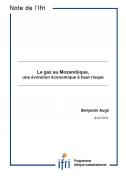Gas in Mozambique: a High-risk Economic Revolution Notes de l'Ifri, June 2014
Since oil was discovered in Uganda in 2006, East Africa has been an arena for a race in the exploration for hydro-carbons. Yet the oil reserves in Uganda, the more recent and modest ones in Kenya and the few pockets of gas in Ethiopia are on a completely different scale from the enormous gas resources discovered since 2010 in the off-shore waters of Mozambique and Tanzania.

The approximately 184 trillion cubic feet discovered in the basin of the Rovuma in the North of Mozambique (a quantity on a par with that of Nigeria) are going to turn upside down both the regional and international markets. If the oil from Uganda is going to have a major impact on the national economy, it will be a mere drop in the ocean for the world oil market. On the other hand, not only will the gas from Mozambique transform the local landscape beyond recognition (probably quadrupling the GNP in little over a decade), but it will also have far-reaching consequences for the world market in terms of prices and future projects.
As a result of the discoveries of gas and the simultaneous development of major coal projects, Mozambique has become in recent years a country welcoming major direct investment (5,000 million dollars’ worth in 2012, when the GNP is no more than 14,000 million). Opportunities for foreign companies with know-how in oil servicing (drilling, pipe-line assembly and factory construction) and associated fields (catering, logistics…) are already plentiful. This will also apply to infrastructure construction (bridges, airports, ports, roads) and the building of accommodation in the gas regions (the province of Cabo Delgado). As regards the gas sector itself, the former President of the leading Italian company ENI, Paolo Scaroni, regularly referred to an investment of 50,000 million dollars for the duration of the project.
While the opportunities for foreign workers will be considerable, it is important to remember that the local political-economic context is highly complex. Independent since 1975, after ten years of armed struggle against the Portuguese colonialist regime, Mozambique then engaged in a civil war, which officially came to an end in 1992 after the Rome Accords. Thus its stable economic history only goes back to 20 years and the consequences of those various conflicts are considerable and will make themselves felt for a good time to come: poverty is endemic and effects up to three quarters of the rural population in the northern parts of the country, there is an almost total absence of skilled labour and a desperate need for infrastructure development. Over and above all that, the private sector is under-developed and to a large extent controlled by leading members of the ruling Frelimo party (with a communist ideology but liberal leanings since the end of the 1980s).
The result of a field study in Mozambique in August 2013, where the author met around 40 of the key players (politicians from the regime and the opposition, those in charge of the oil companies, ambassadors, international donors staff, representatives of bi-lateral and multi-lateral joint projects, the press and NGOs), this paper sets out to analyse the way in which the Mozambique government is preparing for this new phase of development.
Find on our Blog a synthesis of this paper (French only).


